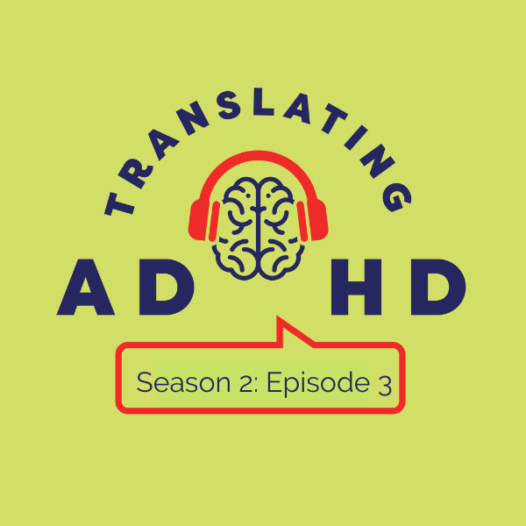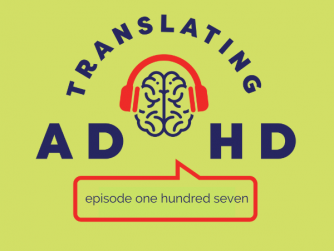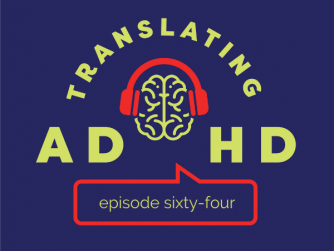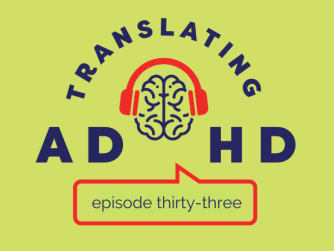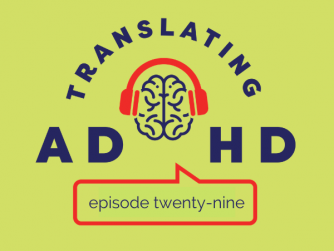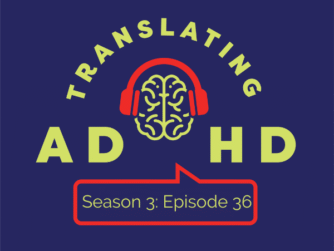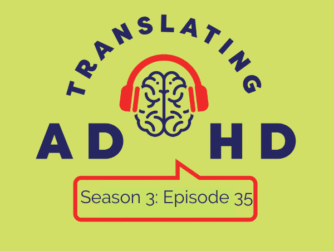In this episode of Translating ADHD, Ash and Cam continue to explore the concept of journey thinking and how it relates to ADHD. They focus on illustrating specific barriers to journey thinning and how ADHD can elevate a destination or fixed mindset. Ash and Cam discuss how ADHD individuals often get attached to certain outcomes, identities, and beliefs, which can hinder their ability to adapt and make positive changes – key to any coaching relationship.
They highlight the importance of embracing journey thinking, which involves being curious about your own experiences, recognizing emotional components, and finding more resourceful ways to approach challenges. The episode features several client examples to illustrate the benefits of this mindset. They also discuss how coaches can benefit from a journey thinking mindset.
Episode links + resources:
For more of the Translating ADHD podcast:
- Episode Transcripts: visit TranslatingADHD.com and click on the episode
- Follow us on Twitter: @TranslatingADHD
- Visit the Website: TranslatingADHD.com
Episode Transcript:
[00:00:00] Ash: Hi, I’m Ash. [00:00:08] Cam: And I’m Cam. [00:00:09] Ash: And this is Translating ADHD. This week we’re going to continue pulling on the thread of journey thinking by looking at some of the ways that ADHD uniquely gets in the way of journey thinking for ourselves and our clients. Cam, do you want to say more about that? [00:00:31] Cam: Sure. Ash, you know, as we start this new season, and as we kind of look back over our library of episodes, we just thought this would be a good place to begin. That journey thinking is one of those things that is so important as you start to embrace change, right, that our clients are coming to help them create change, and often this is the time when they’re locked into destination thinking of coaching.Not only do things have to change, but they have to change this certain way. I have a picture of success for how things need to change. Sort of lock into some very specifics of this ideal picture of success and that how, yes, to be to have aspirations to have goals are important, but in coaching that holding tightly to an outcome can actually be of disservice in the coaching process. So as we said, we were going to give a little bit more insight into the coaching process and how does it work and how it benefits those of us with ADHD. This interesting thing, how actual ADHD barriers that we’ve talked about in the past of the barrier to new awareness, the barrier to new action or any action, and the barrier to learning and pulling that learning forward are actually key cornerstones of coaching. So that it is a coach and client appreciate that they can use that leverage that in this process of change. And as we move through this process of change, this concept called coaching mindset. It’s a core competency in coaching mindset. And it’s just as it’s indicated mindset.
People hear about growth mindset. This is very similar to the concept of growth mindset – Carol Dweck’s work. She talks about fixed mindset and growth mindset. So when we say journey thinking, it is very much along the lines of this growth mindset that we’re not thinking along the terms of certainty or it is this way or it has to be this way.
So today we’re going to talk about the barriers that tend to get in the way so that you have some understanding and start to see them, right? We are going to help you have that understanding piece that you can start to own it and then translate it.
[00:02:58] Ash: Before we dive into barriers, Cam, I just want to talk about what happens when a client is so attached to a destination. I had this happen with a newer client who was a podcast listener, was very on board with journey thinking and the coaching process. But her situation at the time meant that she necessarily had to attach to an outcome.She was in an important internship for her Ph. D. program and it was not going well. And unfortunately, we just couldn’t get anywhere in the coaching because she was so attached to, I have to pass this internship, which meant that she was showing up to coaching, looking to me to tell her what she could do to dig herself out of the overwhelm and to make this all okay.
And talking about coaching core competencies, limiting the expert is a big one, and it’s a big one for a reason. The less I assume about my clients, the better coaching work I do. Because you genuinely never know where a coaching session is going to go. And more so than that, we’ve talked about hundreds of different ways that our clients have solved or created change around very similar ADHD dilemmas.
So if there’s one thing I do know as an ADHD coach, I don’t have a book of answers as to how to live better with ADHD. If I did, I’d gladly put it out there in the world, but the answer is it’s different for each one of us. And that’s what makes this journey thinking so important is this idea of looking at your lived experience with curiosity and not being attached to what you might expect.
[00:04:50] Cam: And I appreciate you bringing up the expert piece, right, as a core competency of managing the expert, and that’s to distinguish the expert of this sort of all knowing. So it’s really fascinating if the people will kind of revert to, oh, I know exactly what this person needs.And the thing that burns my biscuits for sure is the, well, I figured out how it works for me, and so I’m just going to take my method and apply it to you. And so, yes, some of those things can work and having a program is a good idea or a philosophy or approach along with your skill set. That’s your expertise. So distinguishing the expert from all knowing; I know exactly what this person needs. There’s an attachment there, an attachment to this being the one with the knowledge versus one’s expertise, right?
So the expertise in the sense of, we know about ADHD, we know about coaching. We know that coaching process and how to partner with our clients to help them move forward. Yeah. This sort of opening up to possibility to kind of loosening things up just enough to be open to, to be curious. Be looking for something that they’re not, you know. It has to be, as you said, it’s like, I have to do this and therefore, and you’re going to help me solve this dilemma
[00:06:16] Ash: By the way, I just want to toss this in the scenario that I just gave: It would have been really tough for me early on in my coaching career, because here’s this client begging me for answers who is genuinely struggling. And there is a point in time in my coaching career where I would have tried to give her answers. I really would have, and that’s not what we did this time. We parted ways on great terms, by the way, she and I both recognized together in that co-creating process of coaching that while she was in this internship, there just was not an opening for this work. And that’s where we left it. [00:06:56] Cam: Or the coaching work. [00:06:58] Ash: Correct. [00:06:59] Cam: Yeah. [00:07:00] Ash: And I’ve had that happen with clients for a number of different reasons. Something so urgent and all encompassing comes in. And there’s just not an opening for this work at this time, and that’s okay. It’s not only okay, I think it’s the mark of a great coach to recognize that and have that conversation with a client who’s struggling. [00:07:23] Cam: Right. And that timing is such a key piece. And maybe, you know, the internship is the thing that matters and that the coaching is something that I so appreciate you bringing that up, in the sense that it really deserves space for that exploration. So let’s talk a little bit about these again. What are the typical things that get in the way of journey thinking?And it’s sort of, again, this sort of attachment to a job or an identity and attachment to a certain belief, right? By the way, that identity is like, you know, this is who I am. It’s sort of like, you were saying this earlier, I think you have an example of a physician is like this is who I am. This is what I’m supposed to be.
We can also attach to this sense of who someone else needs to be or should be. So this attachment is not just to the individual and it’s also not this ADD thing, right? It’s not just ADHD. Everyone gets attached, especially where they’re in a stressed place. When they’re pushed to a stressed or, you know, again, talk about adrenaline response cycle. Feeling urgent, we go to that fight-flight center of the brain, and we have this again, tend to kind of clamp down on stuff, including what our options are, so we can get attached to a job and identity of belief and outcome.
We can get also attached to an emotional experience to kind of, again, be with a sadness or an anxiety or an anger. So that’s something that I’ve seen. Is this a situation, and a situation is the lack of justice for a situation or the injustice and the anger that goes with it. So yes, anger can be used to create change in that situation, but it can also just sort of foment, again, more kind of solidifying a perspective or point of view. And in coaching, we start to kind of look at how are you looking at this situation to get some distance here. This is perspective work. It’s not just the thing you’re looking at, like the internship, but how are you looking at it?
[00:09:42] Ash: Let me share a little bit about that client that we were talking about before we hit record, because I do think it’s a great example. And it’s a great example of how the coaching work continues, even after coaching has concluded, because I haven’t worked with this client in quite some time. And at the point that we left off, she was going through a transition by way of a breakup and a move. There was a lot going on in her life outside of what we were primarily working on in coaching, which was relative to her career. She was a primary care practitioner and she was very attached to that identity.There’s a word I’m looking for that I can’t freaking find. It’s not acknowledged or firm. Like what’s the thing when you want like praise from somebody else?
[00:10:31] Cam: Validation. [00:10:31] Ash: Yeah, there we go. She liked being able to tell people that’s what she did. There was a sense of validation there, and she really enjoyed the patient work. But everything else was pretty overwhelming. I’ve had a few clients in primary care. It’s a tough spot to be in the modern era when you have a limited amount of time with each of your patients, you’ve got minimal time between patients to do all of your charting, which is required to get paid by insurance. And patients have more access to you than ever with all of these electronic modes of being able to communicate request prescription refills, ask questions.And so there is just this perpetual backlog that existed and, by the way, for the majority of the time that this client and I worked together, she was attached to the outcome of staying in this role. And so we worked on charting and answering messages and sort of the logistics of making this work or trying to make this work. It was toward the very end of our time together that she started looking into maybe changing specialties.
Now, here’s the cool thing is I just caught up with this client a couple of weeks ago, and I just told you where we left off. Well, where she is now is she’s actually taking some time off work, which is huge for this client because while she is able to afford to do so, the identity stuff wrapped in with work along with the shoulds, right – I should be working, I should have to work. I feel a little uncomfortable saying I’m not quote unquote working and I’m uncomfortable with what people might think about a statement like that. It’s just a complete shift for her to be able to say, yeah, in this time in life with all of the transitions that I’ve been through, I’m taking some time off and I am working not for a paycheck, but I have a lot of other work to do in establishing my new household and getting through the other transitions of life and doing the work involved with that.
And it’s okay for me to take time off. I can, and I can afford to. And that’s okay. And so it’s just really cool to see this person who, when we started working together, would have never been able to make that decision for herself on the journey, putting herself in the picture and making decisions from a place of strength.
[00:13:14] Cam: So, and I was just going to ask, like, what did she do to move to that new perspective? Right? This loosening of this identity. And it sounded like you just answered part of that right around seeing herself in the picture. Something from our archive – it’s hard for people with ADHD to see ourselves in the picture and really focusing on strengths and her own values and preferences.What else do you think it was like? What was it that nudged her out of that limiting belief or that attaching to old identity?
[00:13:55] Ash: Well, we talked a lot about her attachment to that identity. We talked a lot about how she felt about taking time off or being, having the means to take time off and what that brought up for her. This was all in the fabric of our coaching work, as we were examining whether or not this role, this identity could be a fit.So, as a coach, I’m always keeping us on the journey, even if I see the client attaching to a destination. I noticed that we’ve talked about it. So some of those threads that we started pulling on and coaching, she just kept pulling on. And she had some other work to do. And so, at the time that we took a break from coaching, she started engaging in some other work that supported that perspective shift as well.
And once again, I tell clients all the time, I’m not here for the whole journey. Right. We’re not going to get from point a to your big agenda just the two of us. It never works that way. We were together for a time. And then the good work that we did, that my client continued to do, along with attending to some new work that had her attention and continuing to engage is what got her there. It wasn’t just me. It’s never just us.
[00:15:18] Cam: It sounds like a great, I mean, what a great journey thinking story in the sense that sometimes what we do in coaching is help our clients reveal what is next. All right that you helped her and she did it on her own, too, of this recognition of, Oh, here are my next stepping stones to borrow from the metaphor from last week of the stepping stones closest to me. And just to identify like, okay, there’s some, there’s additional work to be done here. And I’m going to move in this direction. That’s fantastic, you know, so what a great story.And I think that listeners might be thinking like, okay, this is great. Thank you very much. But how does ADHD come into play here? How does ADHD exacerbate the situation? And it does. And it does in a number of ways. Again, back to episode four. Way, way back with one of our most popular episodes is the Adrenaline Response Cycle and how we get things done is through the latest and loudest, through urgency, through eliciting adrenaline, dopamine to get the latest done and that state of constantly being there, overwhelmed and stressed.
It really ramps up what’s called cognitive inflexibility. So this is an unfortunate term that is tossed around, but this idea of getting locked into a certain way. The simplest way of putting it is it’s really hard for us to see options. So seeing those options of those other choices, we have this one picture and we lock in.
The other thing I’ll say is that with so much uncertainty, so much overwhelm, we’re looking for certainty. So we are hunting. We talk about hunting for the big signal. We also hunt for certainty. We’re trying to pin things down of like, okay, this is this, and this is over here. And my relationship with them is this over here. And as we kind of lock them down to hold them in place, to give us some comfort and certainty, but in doing so kind of are holding things very tightly and not letting it change and evolve or open up.
[00:17:23] Ash: And it can also be this sort of race that we can’t win. This idea that if I can just get this far, if I can just get to this completion, if I can just get this done, if I can just get caught up over here, that will create space that will solve all of my problems. And oftentimes that destination that we’re attaching to isn’t real.You know, it’s that magical ADHD thinking thing we do, where we believe that caught up is a place, this magical land of caught up. And all the to do’s are done and everything’s checked off. And I’m not responsible for anything at this moment in time. And so our problem solving gets all out of whack when we’re overwhelmed, right? We’re just reacting to whatever’s in front of us in this mad scramble to try and get on top of the heap, and we can’t ever get there because we’re not really thinking about the problem in a helpful way.
So, another one of our very early episodes was on time management. And I talked about how, as an organizer, when I worked with clients on time management, ADHD clients have this pattern of, I’m going to reinvent the wheel. I’m going to get a new system. I’m going to do a planner this way. And we’ll spend all this time establishing a system, but never really engaging with it. Well, why is that? Because most of the time the system is not the problem. And if we can reveal what is actually in the way, what is actually at cause, the system comes together so easily, whatever it is.
[00:19:11] Cam: Yeah. I think we talked about this last week a little bit, Asher, about the scramble and the magical thinking of I need to be somewhere else. And with our perfectionism, or I like to use the term more like an exactness, we’re looking for this ideal situation that is not here. It’s not gonna be here. It’s over there somewhere. It’s about six weeks out. I can just get there, right? So this incredible desire to reinvent and retool, discover that missing system. Someone out there has a system, and when I find it, all this is gonna go away.Now, systems and practices can help, but the reason why we’re starting here with journey thinking is that Asher and I feel that this is something that can benefit anyone struggling with their ADHD, whether they have a coach or not. And to, again, stay where you are, to be where you are in that pond, and to be curious about what is the work that is available to you here and now, in this moment. And the big signal, again, is pulling you to, I got to get away from here. And I’ve got to get to that picture over there. What is the picture right here? What am I? What’s the thinking that I’m locking into with absolute certainty? And can you be a little more flexible in that cognition? More flexible in your thinking to hold it a little lighter and not so tightly.
[00:20:48] Ash: I’ve actually got a great little client example to illustrate what you just said. I have this client who is an animal researcher, works with data, and we’ve been working together for quite some time. And a thread we’ve pulled on in a number of different ways, and that we’ve had a good amount of success on to a point, is what he likes to call bureaucratic bullshit.He works for the government. There’s a lot of bureaucracy in his job. And it can really get him down. It can really be a struggle to deal with the bureaucratic stuff. And that’s the stuff that he tends to avoid most often. Just last week, we had a great little breakthrough about bureaucratic bullshit.
I don’t remember exactly what we were talking about. But the action that we came to was that when he writes down the bureaucratic task, he also wants to write down the project it’s connected to, because what he realized is when there’s a new project, when there’s momentum, when it’s connected to something he is passionate about, when it’s getting the red tape out of the way to get this grant or get this thing approved or be able to do this project here, that there is an amount of momentum and not quite enthusiasm, but something adjacent to enthusiasm for working on the bureaucratic stuff. But then over time, as that project drags on and the red tape and the bureaucracy of it all drags on and things, little things keep popping up, he loses that connection to this is in service of this bigger thing.
So I don’t actually know what the outcome of that particular action is going to be, because this was a coaching session that happened just last week, but the more exciting thing, whatever the outcome of that action is, is that my client is now recognizing there’s this emotional component to bureaucratic stuff. And there’s an emotional component that maybe I have some leverage over because I’m realizing that it’s not always awful and avoidant. There are times that I can engage and power through it. And when I can engage and power through it, it’s because I have my eye on the bigger prize, on the thing I am passionate about.
So just an example of how the stuff behind the stuff is what matters, right? It’s not about having it all organized on a task list. It’s about my client’s relationship with bureaucratic bullshit and what we can learn about that to help him have a different experience.
[00:23:35] Cam: I love that example. And I, also the other two examples, right? There’s the first one around the internship. The second one around the identity of being a practitioner and letting go of that. And this one right here. And it speaks to this coaching process of when you embrace journey thinking and you start to, again, just notice patterns of thinking patterns of feeling, you start to chip away at these ADHD barriers, getting to a new awareness. Like, oh, it’s not just that I don’t like the bureaucratic BS work. It’s there’s an emotion there that comes into play, and that emotion has something to do with demotivating. And so that recognition of that awareness then allows us to be more resourceful in the moment.And that’s what we’re working for with our clients. That’s what you can do out there, listeners, is how to be more resourceful in the moment. And it starts with this recognition of what’s going on here to not operate in overwhelm and fear and trying to get away from where you are, but to really bring some curiosity to this dilemma. It’s just a bit more of a process.
Last season, I was talking about some assembly required for those of us with ADHD. There’s some assembly required in the sense of really getting a sense of how am I feeling about this? What is my perspective on this? Who is a resource? How can I be a resource here? How can I step back and look at this in a different way?
Back to Carol Dweck’s work around growth mindset. This is what we’re talking about with charity thinking. And the fun part is, is yes, here the, the client figures out a way to take care of these BS, you know, type tasks, but they develop this awareness now and this recognition of how they tend to operate and how they can adjust to a dilemma. This is one of those things that is in that, again, self esteem, self actualization piece around needs. Is that the power to solve our own dilemmas is very much of a human desire to be able to have agency and solve our dilemmas. And so this is where we can see journey thinking is a really valuable tool.
Again, it’s not something you have to have before you start coaching. As Asher said, it’s like you have a guide. And you have a guide if we’re going along, it’s like, oh, okay, what are you attached to there? Is there some destination you’re looking at? Is there some belief that is driving your thinking and your behaviors here? What’s the opportunity here? How can we look at this differently? Really interesting. I think this is a really great instinct on your part, too, to choose this area of focus for our first couple episodes.
[00:26:36] Ash: Yeah, journey thinking is just at the heart of everything we do as coaches. We’re just endlessly curious. And coaching at its best means the coach is never attached to where the coaching goes, and the coach is noticing where the client is attached as you just so nicely said. I think this is a great spot for us to wrap for today.I’m excited to carry on next week, zooming or looking at a different, but related concept in coaching. And that is this learning action model and what that is, and how it informs our coaching practices. So until next week, I’m Ash.
[00:27:16] Cam: And I’m Cam. [00:27:17] Ash: And this was the Translating ADHD podcast. Thanks for listening.
